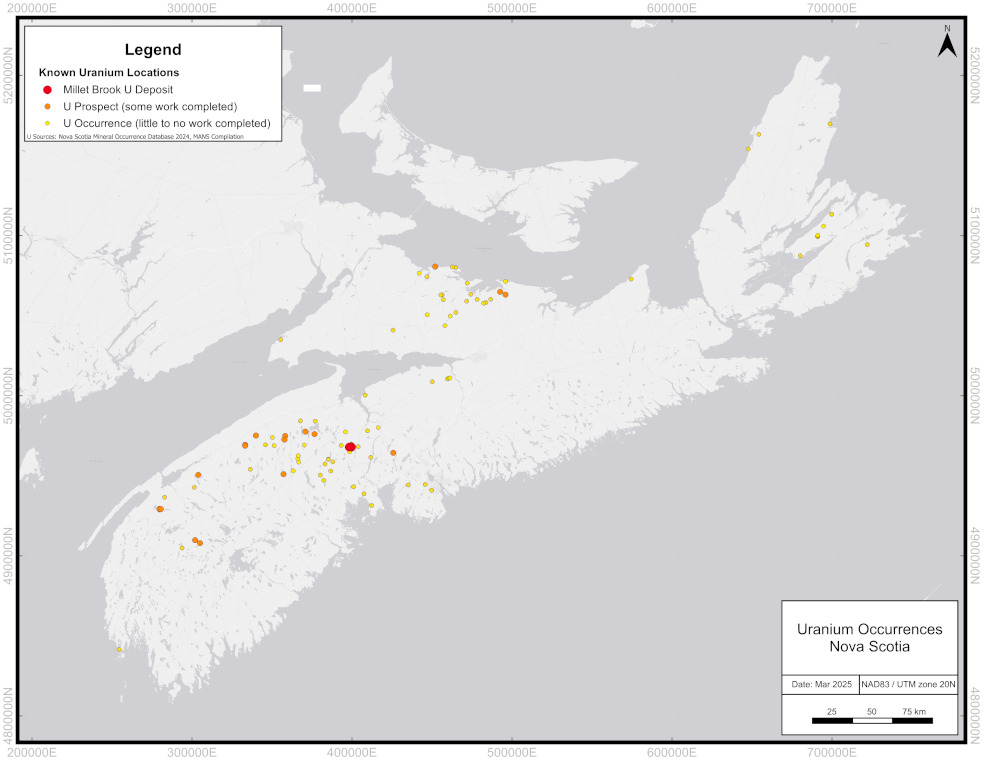Uranium
The Government of Nova Scotia repealed its ban on uranium exploration and mining in 2025. This sent a signal to the global mining industry that Nova Scotia is open for business, that we want the jobs, investment and economic opportunity that mining and quarrying create. It told the world that the Government of Nova Scotia is committed to making policy and permitting decisions based on science and facts, not misconceptions and politics.
Uranium is a critical mineral. The term “critical minerals” usually refers to minerals that are particularly important in achieving climate goals and for which there are supply concerns. Examples include lithium, which is used in electric vehicle and cell phone batteries, and copper, which is used in wiring. Critical minerals can also include minerals essential for the digital economy and national security.
Uranium is considered a critical mineral because it is the key nuclear fuel. Experts around the world agree that nuclear power is essential to achieving climate goals because it provides vast quantities of baseload energy without generating any greenhouse gas emissions. Countries around the world, including Canada, have committed to tripling nuclear power generation as part of trying to achieve Net Zero emissions by 2050.
Tripling nuclear power generation will require huge additional quantities of uranium in coming years, and there are concerns about shortages.
Uranium also makes possible things like smoke detectors and medical equipment and procedures, such as radiation therapy treatments for cancer patients.

If uranium is that important, why did Nova Scotia ban exploration and mining of it?
Nova Scotia had a boom in uranium exploration from approximately 1976 to 1981. Tens of millions of dollars were spent on exploration. Companies like Shell Canada, Esso Minerals, Gulf Minerals and others were actively exploring in the province.
Uranium occurrences were documented all over Nova Scotia. Other minerals were also discovered during this period as a result of exploration for uranium.
The boom ended when a politically-motivated moratorium was imposed, in the middle of an election campaign, that had no basis in scientific evidence.
The moratorium nipped in the bud a potential uranium mining industry that could have brought much-needed jobs and investment to the province.
Uranium mining today is very different from what it was when Nova Scotia banned it. Today, most uranium is mined using solution mining (aka in-situ leaching), which results in less disturbance at surface and produces basically no tailings or waste rock.
The Canadian Nuclear Safety Commission (CNSC), the science-based Government of Canada regulator of nuclear activities, including uranium mines, says uranium mining is safe for both humans and the environment.
Some people say we should leave uranium in the ground because they think - incorrectly – it is safer there. The truth is uranium naturally causes health and safety risks, such as radon gas and elevated uranium levels in our water supplies. Nova Scotia’s uranium ban prevented us learning more about our uranium deposits and how to improve public safety.
Nova Scotia’s uranium ban could also have prevented the province from producing other critical minerals that are essential to achieving climate goals. Since uranium is sometimes concentrated in deposits of other critical minerals such as copper, lithium and rare earth elements, the ban could have prevented mining the other minerals.
Saskatchewan has been one of the top suppliers of uranium globally since the 1950s. If uranium actually caused the problems that some allege, the people of Saskatchewan would tell us so. Instead, 83% of people in Saskatchewan support uranium mining, according to polling, and uranium has helped Saskatchewan transition from a “have-not” to a “have” province.
Banning economic activities like uranium mining without legitimate cause harms our economy, discourages investment and costs Nova Scotians jobs. It makes Nova Scotia and Nova Scotians poorer.
Ending Nova Scotia’s uranium ban allows the industry to do exploration and determine whether our uranium deposits are economically-viable. It also generates more data on the province’s geology which governments can use to help keep Nova Scotians safe from geohazards like radon and uranium in drinking water.





